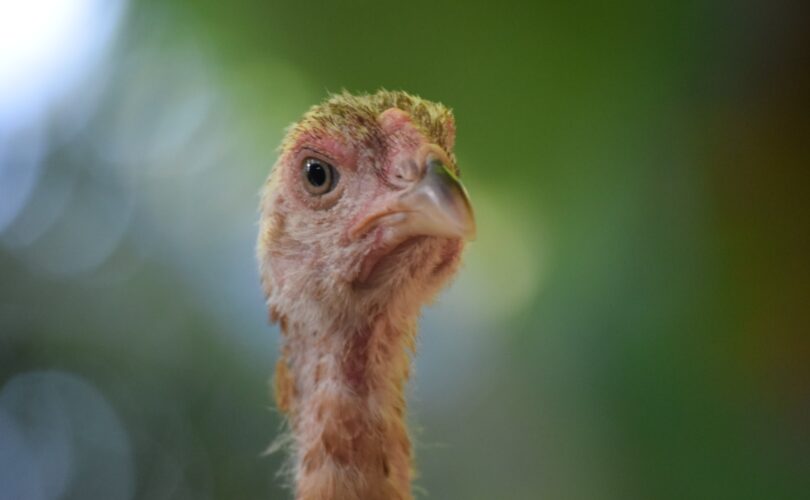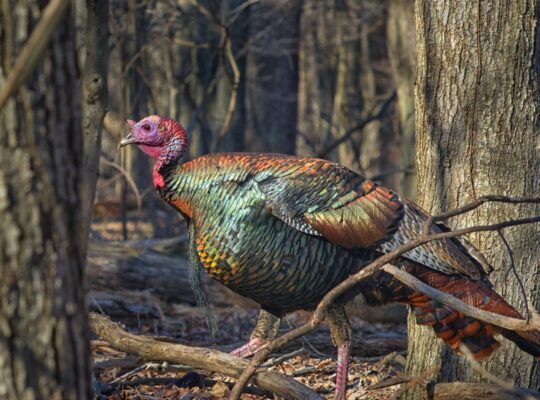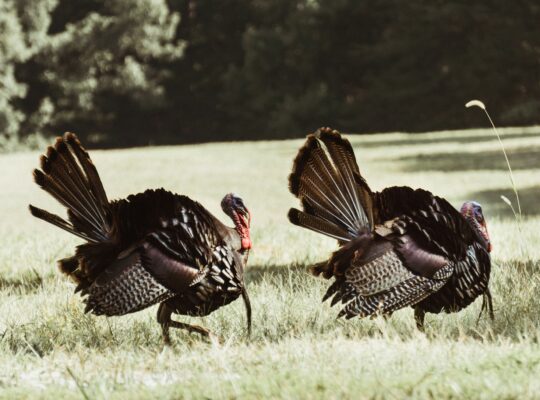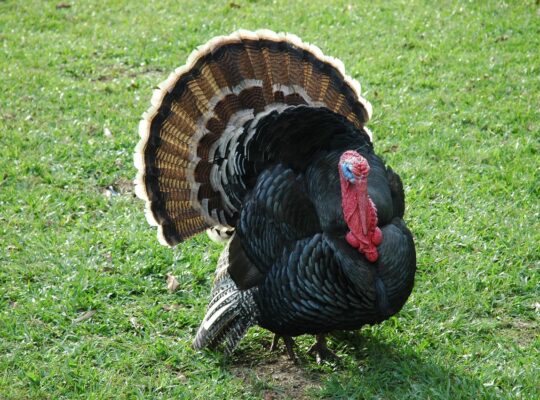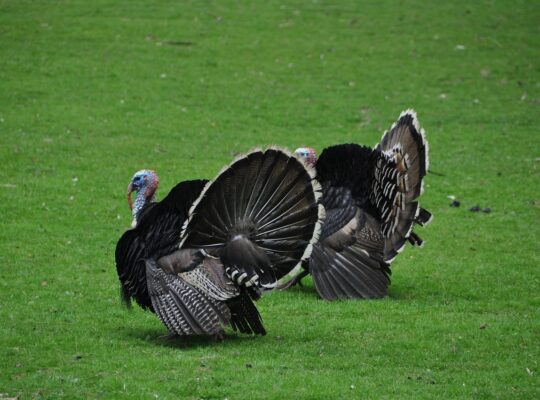Baby turkeys, commonly known as poults, have different dietary needs than adult turkeys. To promote optimal growth and development, they must be fed a well-balanced diet from the beginning of their lives. While adult turkeys are known to consume a wide range of items such as seeds, fruits, and insects, the diet of newborn turkeys is more limited and needs specific care. Understanding what young turkeys eat and how to supply them with the proper nutrition is critical for their survival and well-being.
The newly hatched poults cannot leave the nest for the first few days after they have been born, and as a result, they are unable to seek food. They will consume the yolk sac during these early stages since it contains all the essential ingredients for their continued existence. As soon as they can leave the nest and begin exploring their surroundings, they will begin eating turkey starter feed, which is typically a crumbly, grain-based diet with added vitamins and minerals to support their growth. This feed is introduced to the turkeys when they are old enough to leave the nest.
It is possible to gradually introduce additional foods, like greens, maize, and barley, into the diet of the poults as they continue to develop and thrive. Growers of turkeys will also monitor the amount of food consumed by the poults and make dietary adjustments as required to ensure that the young birds get all of the essential nutrients for optimal development and health.
In addition to ensuring that the poults have access to a nutritious meal, it is essential to make sure that they have uncontaminated, fresh water available to them at all times. It would be best if you did this to have healthy digestion, enough hydration, and general wellness.
The diet of young turkeys consists mostly of foods high in protein, such as turkey starter feed, but as the birds age, they also eat other components of their diet. Providing nutritious meals and clean water is essential to baby turkeys’ health and development.
What do baby turkeys eat in the wild?
Chicks or poults are the common names for young turkeys who still depend on their parents for nourishment. They consume most of their food during the first week of their lives, consisting of insects and other small invertebrates like beetles, ants, and spiders. These insects may obtain the protein and several other nutrients necessary for the development of the chicks.
As they age, they consume a wider variety of things, including seeds, grains, and leaves. They consume rodents and amphibians, such as mice and voles, and small reptiles and amphibians, such as lizards and frogs.
The young birds can locate sources of nutrition in various environments, such as open fields, dense woodlands, and wetland areas. They rely on their senses of sight, smell, and hearing to find food. They have an acute sense of sight, which enables them to locate insects from a greater distance, and an acute sense of smell, which enables them to locate food hidden below. It is also essential for them to have good hearing to notice the motions of the smaller animals and reptiles.
Mother turkeys, known as hens, play a fundamental role in the survival and development of the chicks. The hens bring the chicks to food sources and help protect them from predators. In addition, the hens will vomit food for the chicks, providing them with a rapid supply of nourishment when food is limited.
In a nutshell, when they are raised in the wild, young turkeys consume a wide range of foods, such as seeds, tiny reptiles as well as insects. The young birds can find food using their senses, and their moms offer protection and care for them by guiding them to sources of food and supplying them with nutrients when hungry.
Can you feed baby turkeys bread?
Bread is not a good food choice for young turkeys and should be avoided. Poults have particular dietary needs to reach their full potential as adults. They require a well-balanced diet that gives them all of the essential nutrients, vitamins, and minerals they need to flourish and grow.
On the other hand, bread is not a nutritious food for young turkeys and should be avoided. Because it is made from refined flour, which is high in carbohydrates but low in essential nutrients, it can cause digestive issues in baby turkeys. Refined flour also contains fewer essential nutrients.
To ensure that they can keep up with their rapid rate of development, baby turkeys need a diet rich in protein during the first few weeks of their lives. This can be accomplished by using a turkey starter feed that is available for purchase and is designed specifically to cater to the dietary requirements of young turkeys.
Because these feeds contain a well-balanced combination of ingredients, such as soybeans, corn, and wheat, in addition to the necessary vitamins and minerals, they can provide the birds with all of the essential nutrients they require to develop into robust and healthy adults.
Can Baby Turkeys Eat Vegetables?
As part of a well-balanced diet, newborn turkeys may consume vegetables. In fact, including veggies in their diet may supply essential vitamins and minerals that aid in their growth and development. It is crucial to remember, however, that newborn turkeys are omnivores, and their main food source should be a high-quality commercial turkey starter feed with all the elements they need for development. Once the birds are 2 to 3 weeks old, vegetables may be fed in tiny quantities as a supplement to their usual diet.
When feeding veggies to newborn turkeys, it is recommended to cut or puree them to make them simpler to ingest and digest. Leafy greens, carrots, squash, and pumpkin are all good choices. It is critical to remember to carefully wash all veggies before feeding to eliminate any dirt or chemicals.
Furthermore, some vegetables, such as avocado, which may be harmful to birds, and others, such as onions and garlic, which can cause digestive disorders, should be avoided while feeding newborn turkeys. Providing a balanced diet of commercial feed and fresh veggies to newborn turkeys may help them develop and flourish.
How To Get Baby Turkeys To Eat?
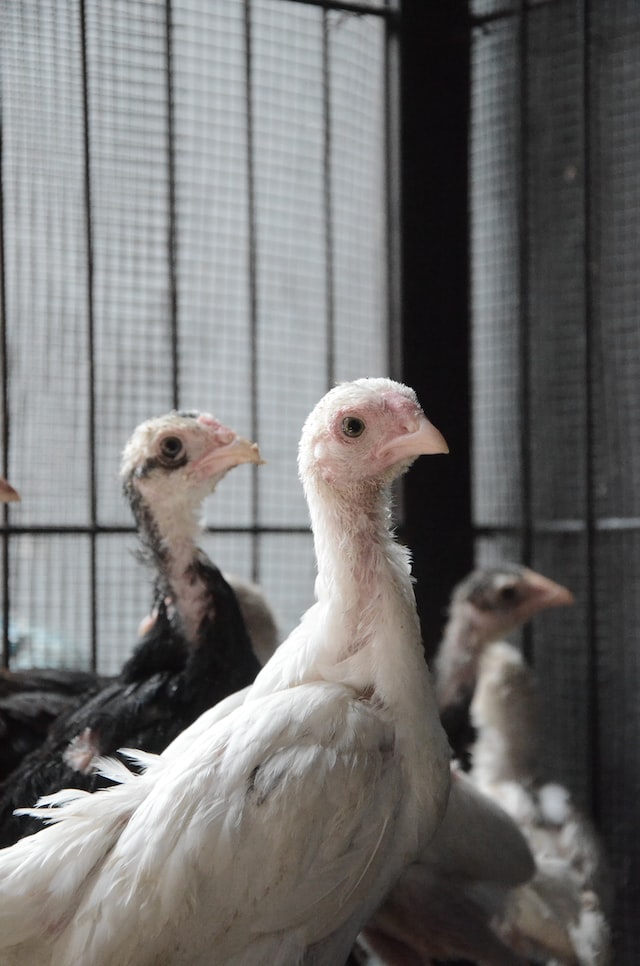
Getting newborn turkeys to eat can be challenging, particularly if they start out on solid food for the first time. Offering them a high-quality commercial turkey starting feed is one of the most effective methods to get them to start eating, so do your best to get them to take it!
This particular kind of feed has been developed specifically to fulfill the nutritional requirements of young turkeys, and it is recommended that they use it as their principal source of nourishment for the first few weeks of their lives. Because they require water to digest their food properly, turkeys should always have access to fresh water. This is another vital aspect of caring for turkeys.
Another strategy for getting young turkeys to eat food is to provide them with a selection of different foods. You may provide them with modest portions of chopped or pureed vegetables, such as leafy greens, carrots, and squash, in addition to the commercial starting feed that they are already receiving.
You may tempt young turkeys’ appetites by presenting them with bite-sized portions of items that are high in protein, such as eggs that have been hard-boiled or mealworms. Additionally, ensuring that all birds have equal access to food and water in the coop or brooder may be facilitated by dispersing the feeders and waterers across the space in question.
It is essential to monitor their feeding patterns and ensure that they are consuming an adequate amount of food while also ensuring that the feeders and waterers are open enough.

